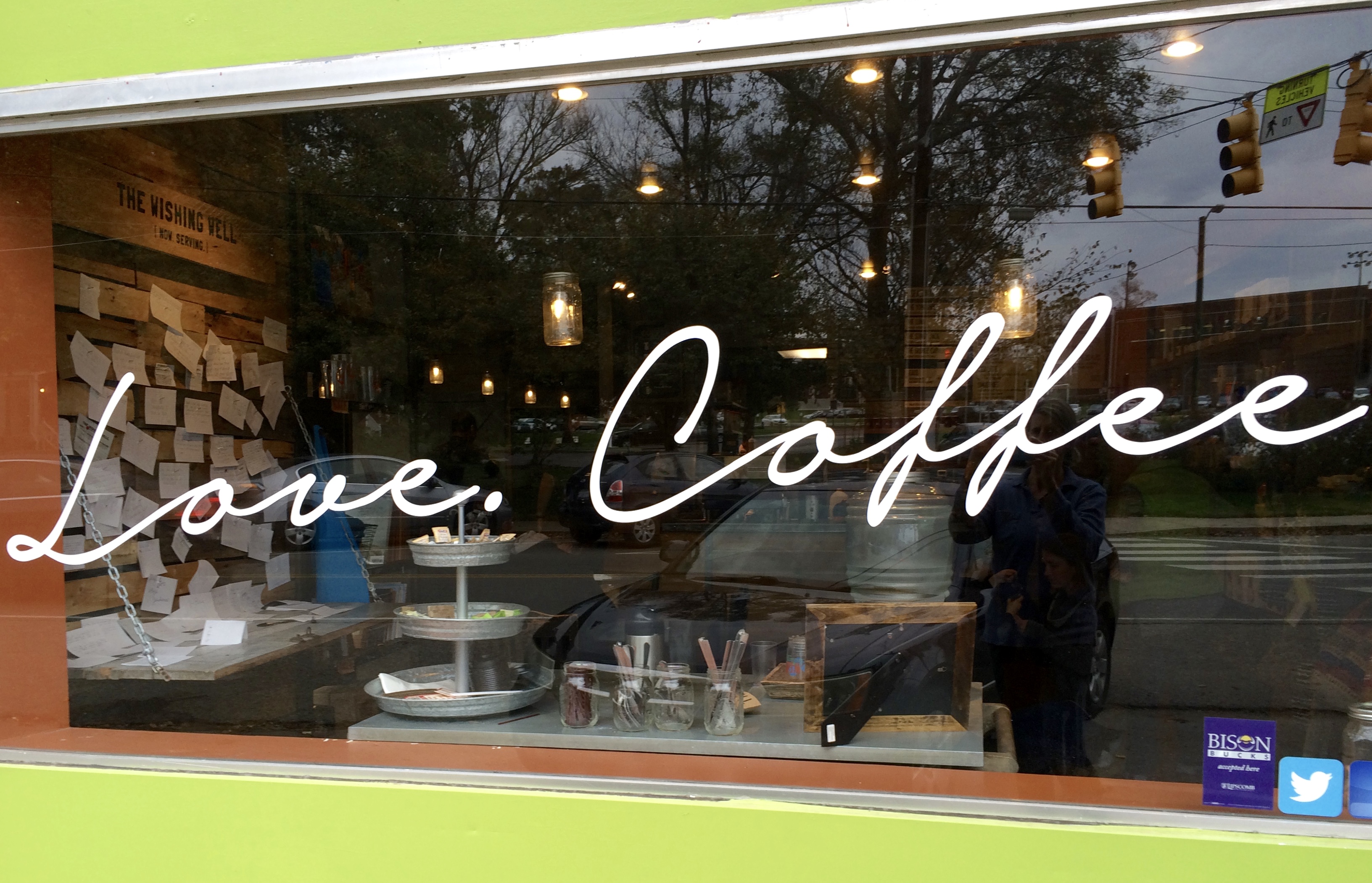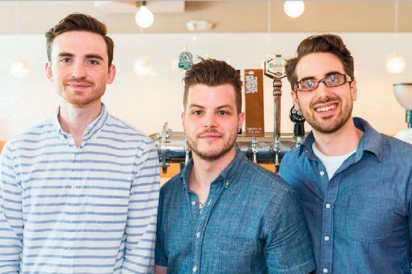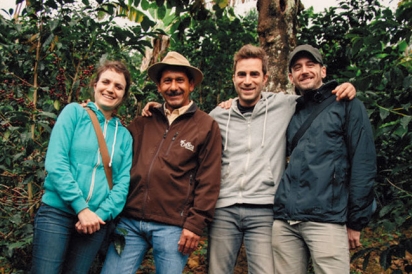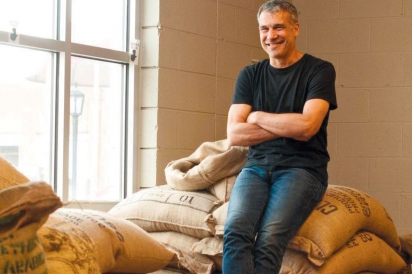Love in the Time of Coffee
Coffee is a little bit science, a little bit art, and a lot of Nashville.
On or about six hundred years ago, human character changed – or at least became more alert. It happened in Ethiopia, the land where coffee trees are naturally grounded. Legend has it a shepherd named Kaldi noticed the effect the trees' beans had on his goats and, taking some of those beans to a local monastery, invented the first cafe. The monks (lacking laptops and headphones) chanted together instead, and well into the night. Poof – coffee culture was born. And it was good.
Google “coffee house Nashville” and the map on the screen erupts with more red dots than a first grader with chicken pox. The reason is that coffee is far more than just a stimulating drink; it is the liquid nucleus of a cultural institution. “Socially, it's a unifier,” observes Jamie Cunningham of Steadfast Coffee. “Cultures throughout the world have coffee traditions and ceremonies that have developed over centuries into modern times.”
But Nashville's coffee choices were not always so rich. There was a time (and not that long ago) when a coffee break meant a spoonful of brown crystals stirred into a hot cup of water in a windowless break room. Today, our coffee choices are far more complex, making the drink more intimidating—even to those of us young and (presumably) in the know. My husband, for example, is a barista and I can’t comprehend why we have to make counter space for so many pour-over devices. Nashville's coffee entrepreneurs, however, know the complexities of the bean—the growing, the sourcing, the grading, the brewing— and the hard work that the farmers put in to earn a living for their families. Today coffee is more than just a drink, it’s a way of life, and one that connects us to other cultures and traditions. And it’s quickly become the standard in Nashville.
WHEN IT ALL STARTED
When he moved here from Chicago in 1988, Bob Bernstein quickly noticed a void in a place people could feel welcome and enjoy a good cup of coffee. “When I was going to high school, I was driving to the next town over to visit the coffee house to read and write,” Bernstein said, “and in college I studied in coffee houses.” Bernstein saw an opportunity; long before the coining of the term “third space,” Bob saw the need for a casual hang-out or alternative workspace. In 1993, he opened Bongo Java on Belmont Boulevard. By 1996, the company started roasting their own coffee.
Starbucks did not have a presence in Nashville at the time Bongo began. Although Bob was nervous about what the chain might do to his business when the Starbucks on 21st Avenue opened in the late 90's, he sent them flowers. Bob laughs as he adds, “I got a call from one of my customers and he says, 'why did you send flowers to Starbucks?' and I said, 'why were you at Starbucks!?'”
Rob Webb of Just Love Coffee remembers his father delivering coffee to offices before Bongo Java. Rob’s father started Webb’s Coffee Service (now Webb’s Refreshments) in 1976, delivering coffees and refreshments to businesses in Middle Tennessee. Webb’s delivered pre-portioned packs of coffee to offices, including Vanderbilt’s campus, and began noticing a change in the 1980s for the demand in coffee and supply available. As desire for coffee in offices was skyrocketing, pre-portioned packages of coffee for drip machines went from 3.5 ounces per pot in the 1970s to 0.8 ounces per pot in the 80’s; manufacturers changed the serving sizes to keep up with demand and—consequently— the coffee was a bit watered down. In 2009, Rob began roasting Just Love Coffee with altruistic motives; he started roasting and selling beans to raise support for an adoption, and now helps other families do the same through fundraising with Just Love Coffee.
Fast forward to 2015; Nashville now has over 110 coffee shops (according to Yelp listings, counting both independently and corporately owned coffee houses). Compare that to some of our neighbors: Memphis has over 45, Birmingham over 75, and Atlanta has over 100 coffee cafes.
Jamie Cunningham is one of the partners of Steadfast Coffee which opened in 2015. In regards to Nashville being seen as a “coffee city” he remarks, “Nashville wasn't always known for good coffee. Its transition into a coffee city is due in part to some tenacious entrepreneurs who opened shops hell-bent on raising the standard of excellence in Nashville's coffee industry.” Entrepreneurs like Bernstein, CREMA owners Rachel and Ben Lehman, the group at Steadfast, and so many more hardworking shop and roastery owners around town.
Nashville coffee has grown alongside the city. Nashville staples like Frothy Monkey, Eighth and Roast, The Well, and Barista Parlor not only have expanded to multiple locations, but are roasting their own beans as well, or have plans to in the near future.
COFFEE IS THE NEW WINE
As the number two traded commodity in the world, coffee is globally connected and internationally governed. When the CREMA staff discusses coffee, it all sounds very academic. Rachel Lehman explains that “specialty grade coffee is cupped and scored on a system that is set by the Coffee Quality Institute…and Coffees over an 80 score are considered specialty grade… It's not a willy-nilly thing.” The coffee that is found at many (if not all) independent shops in Nashville is considered specialty grade coffee, whereas coffees you might find in grocery or convenience stores and chain restaurants may be considered “commodity coffee” under an 80 score. We value our coffee so much that coffee “cuppings” are becoming more commonplace. A cupping is the practice of observing the tastes and aromas of brewed coffee—similar to a wine tasting, without the buzz. Frothy Monkey has weekly cuppings Fridays at 2pm, Revelator in Hillsboro Village offers a cupping every other Monday at 10am, and Honest Coffee Roasters on Sunday afternoons starting mid-January.
COFFEE AS A GLOBAL FORCE
Grading scores help coffee farmers know where their coffees lie in international standards, and keep global coffee evaluation fair. The folks at CREMA buy based on direct relationships with the farmers or through trusted sources. That way, they can be sure farmers are getting a fair and accurate price for their work. In fact, CREMA likes to keep close ties with their producers by making routine trips to visit farms they purchase from—CREMA staff get to share meals with farmers at their dining-room tables as well as learn more about coffee production at the farm level—and on occasion have coffee producers visit them in Nashville. Bongo Java Roasting Co. began purchasing coffee with the wellbeing of coffee producers in mind in the 90’s, and Steadfast also makes it a priority to purchase “relationship coffees” (as Steadfast and CREMA call them)—or as Bob says, “almost directly from small scale producers.”
“I've been to big industrial coffee farms that produce great tasting coffee, but at what expense?” says Bernstein. From his travels, he saw that many workers on industrial coffee farms live similar to indentured servants with no way out.
Rachel Lehman: “I fell in love with coffee for the hospitality, but as I get older it feels more and more to me like it's important work on many levels.”
Ben Lehman wants customers to understand that coffee is picked by hand. “When someone is upset about the price of something, I want to say someone as old as their mom hiked up over 1000 feet, and picked these cherries by hand and carried them on their back down a mountain. Then, it was processed very delicately and stored perfectly, shipped thousands of miles here, and then we roasted it, and then the person in front of you now prepared it,” he passionately explains, then smiles and adds, “So... what was your thing about the price again?”
SHOPS THAT ROAST
Bob says he made the decision to start roasting in 1996 because “I thought it was something different to do... eventually it made economic sense to roast our own coffee, but at first it made no economic sense.”
When CREMA owners Rachel and Ben Lehman moved to Nashville in 2003, the primary two local roasting companies were Bongo Java and Portland Brew. At the time CREMA began, lots of smaller places like CREMA used local roasters or roasters from outside the state for their specialty coffee. When CREMA opened in 2008, Rachel later decided that she wanted buying power over what coffees they were using and more control over the quality, and decided to start roasting in 2011.
“Moving from small-batch roasting, you lose something,” says Lesa Wood about larger, more commercial roasting operations. Lesa is the owner and roaster at Eighth and Roast, and she began roasting in 2009. She roasts her coffee in smaller, controlled batches and also purchases her coffees based on relationships with producers. For Lesa—who runs Eighth and Roast’s roasting program down to the routine maintenance of her machines—roasting independently allows her to change it up quite a bit from coffee to coffee as “every coffee has its own recipe.”
COFFEE AS ART
When Bongo started roasting coffee in 1996, Bernstein received interesting advice. “The guy I bought the roasting machine from said you should look for an artist – whether they’re a musician, an artist, a chef— find somebody who has an artistic bend because they'll get into it.”
Winston Harrison, roaster at CREMA and a talented musician, laughs that he started drinking black coffee when he was sixteen “because I thought it made me cooler.” During college, where he studied music, he got a summer job at as a barista and “I felt like I belonged somewhere and liked the people I was working with and enjoyed it. It was a really positive experience.”
Jamie is also a musician, an excellent drummer in fact. Bob's a writer. Apparently, Rachel studied voice and piano.
And maybe that’s why Nashville is a caffeinated city. We are a city of creatives, of all kinds.
BEST COFFEE SHOPS FOR SWEETS
1. Slow Hand Coffee
2. DOSE Coffee and Tea
3. Bongo Java
BEST COFFEE SHOPS THAT SERVE WINE OR BEER
1. Steadfast Coffee
2. Flatrock Coffee, Tea, & More
3. Edgehill Cafe
COFFEES THAT GIVE
1. Koa Jai Coffee
2. Just Love Coffee
3. The Well Coffeehouse
BEST SHOPS FOR WORKING
1. Ugly Mugs Coffee & Tea
2. Barista Parlor
3. Frothy Monkey @ Grimey's Too
BEST SHOPS FOR DINNER
1. Fido
2. Frothy Monkey
3. Café Coco
COFFEE SHOPS WITH GLUTEN-FREE GOODS
1. The Post East
2. Revelator Coffee Company
3. Slow Hand Coffee
COFFEE ON TAP
1. Just Love Coffee
2. Mitchell Deli
3. Daily Juice Café
"FAIR TRADE" IS OUT, “RELATIONSHIP COFFEES” ARE IN
This means coffees are purchased fairly based on direct, established relationships with farmers.
TASTER’S CHOICE: A CUPPING
It used to be “smell, swirl, and sip.” Now it’s “smell, smell again, and slurp.” The former is the method for tasting wine, the latter is for coffee.
Oenophiles may think a wine tasting is more involved, but java-lovers may take exception to that. I’m not sure I fall solely into either category, but on a late fall afternoon I found myself with 19 other journalists at Frothy Monkey for a “cupping.” Not to be confused with the ancient massage technique of placing petite cups on an individual’s back to pull out toxins (resulting in a look much like the underside of a bath mat). A cupping in the coffee world is the traditional way of evaluating coffee beans.
The multi-stepped process lets you explore different coffees— whether single origin or special blend—from beans to brew. It begins with dry fragrance—you deeply inhale the fresh grounds. Then hot water is poured over the grounds and allowed to steep, forming a crust. After three minutes, you break the crust with a spoon and take in those aromatics. This is followed by taste: slurping the coffee. What are the flavors you detect? Caramel? Toast? Blackberry? Is it peppery and warming? Pungent and smoky? Last comes the actual sip. How does it feel in your mouth? Thick or thin? Bright or sharp? Is it balanced? Finally, assess the aftertaste—are you left with a pleasing afterglow?
The Specialty Coffee Association of America designed these standards for professionals worldwide to follow in judging a coffee's quality. But you don't have to be a Master Taster to enjoy the process—a kind of ritual—at Frothy Monkey Roasting Company.
On Fridays at 2pm, Frothy hosts public cuppings in their sleek roasting facility on Ewing Avenue. Contact them for more information, or drop by.
Frothy Monkey Roasting Company 613 Ewing Ave. | (404) 314-5405 elizabeth@frothymonkey.com
Barista
In Italy, a barista is a male or female "bartender" who typically works behind a counter, serving both hot drinks (such as espresso) and cold beverages (alcoholic and not). Here in the states the term is frequently accompanied by skinny jeans and a beard.
WATCH COFFEE BEANS BEING ROASTED:
Eighth and Roast · Barista Parlor Golden Sound CREMA Coffee Roasters · Honest Coffee Roasters Humphreys Street Coffee Co. Roasting Room








